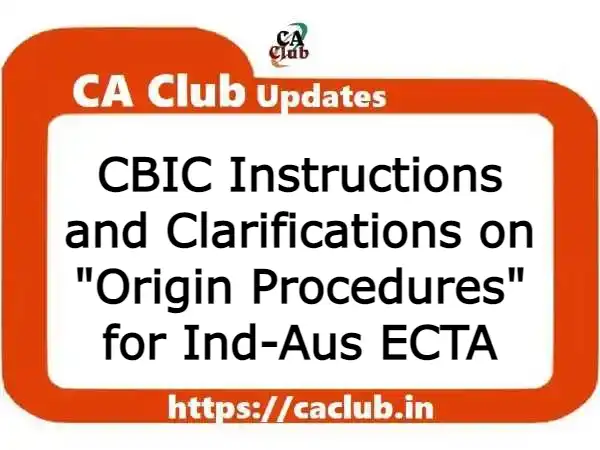The Central Board of Indirect Taxes and Customs (CBIC) issues instruction to clarify the issues related with implementation of origin procedures under the India-Australia Economic Cooperation and Trade Agreement (Ind-Aus ECTA).
This is a follow-up to a previous instruction issued on August 17, 2022, which called for consistent application of the Customs (Administration of Rules of Origin under Trade Agreements) Rules, 2020 (CAROTAR) with the rules of origin (ROO) and operational certification procedures (OCP) of relevant free trade agreements (FTAs).
The new instruction clarifies certain aspects related to the implementation of ROO and OCP under the India-Australia ECTA. One of the key points is that electronic certificates of origin (e-COO) are recognized under the agreement. An e-COO, issued electronically by the authorized issuing bodies or authorities of Australia, is a valid document for claiming preferential benefit under the ECTA if it has been issued in the prescribed format, bears the seal and signatures of the issuing body, and fulfills all other requirements stated in Customs (NT) Notification 112/2022 dated December 22, 2022.
The instruction also mandates that the e-COO be uploaded on e-Sanchit by the importer or customs broker for availing preferential benefit. The e-COO particulars, such as unique reference number and originating criteria, must be carefully entered while filing the bill of entry. For defacement purposes, a printed copy of the e-COO must be presented to the customs officer, who will cross-check the unique reference number and other particulars entered in the bill of entry with the printed copy of the e-COO.
The instruction also notes that affixing a QR code on the COO/e-COO is not a requirement under the India-Australia ECTA. Additionally, absence of overleaf notes on the COOs received from Australia may not be a ground for initiating verification or denial of preferential benefit. The instruction also acknowledges that exporters may not always know the port of destination due to geographical distance, weather disturbances, logistical convenience, etc. In such cases, Australian issuers fill the port of destination field with “any ports in India,” and this should not be a ground for initiating verification or denial of preferential benefit.
The CBIC’s instruction is expected to provide clarity to stakeholders and facilitate ease of doing business between India and Australia.
CBIC Customs (NT) Instruction 10/2023 dated 10/03/2023: Clarifications on Origin Procedures for Ind-Aus ECTA
